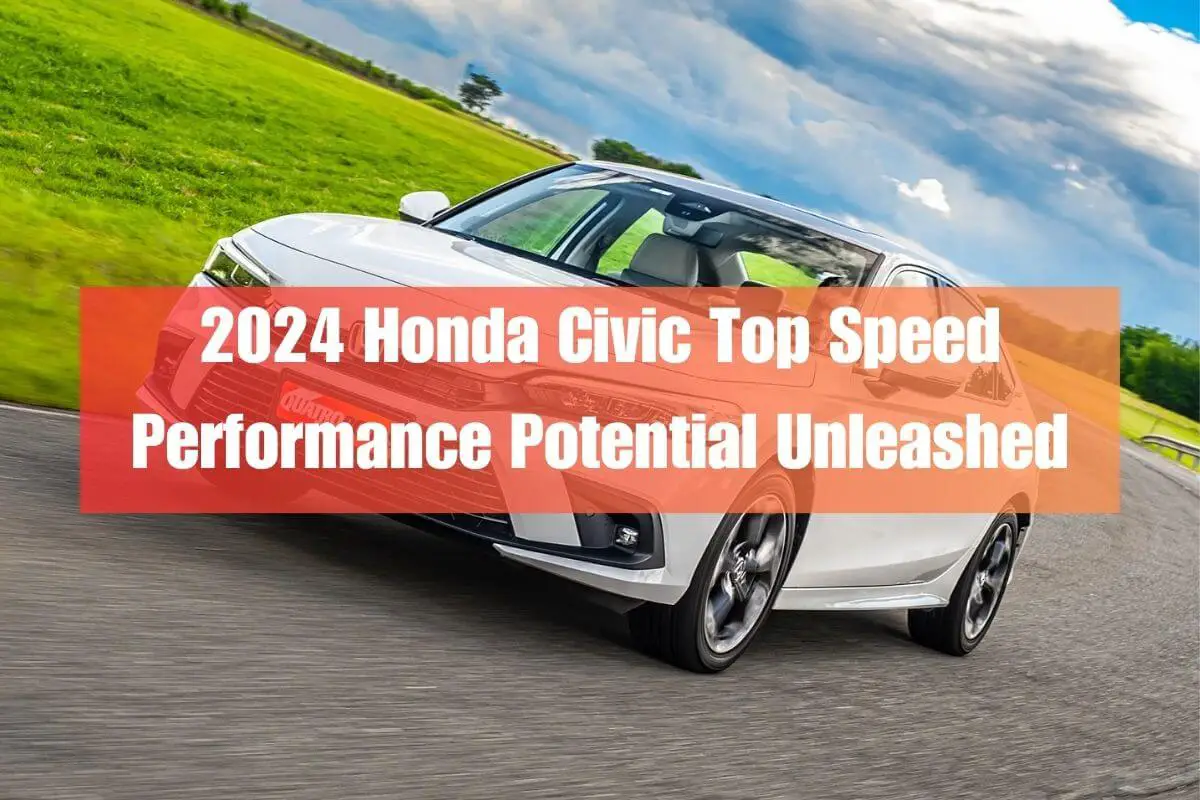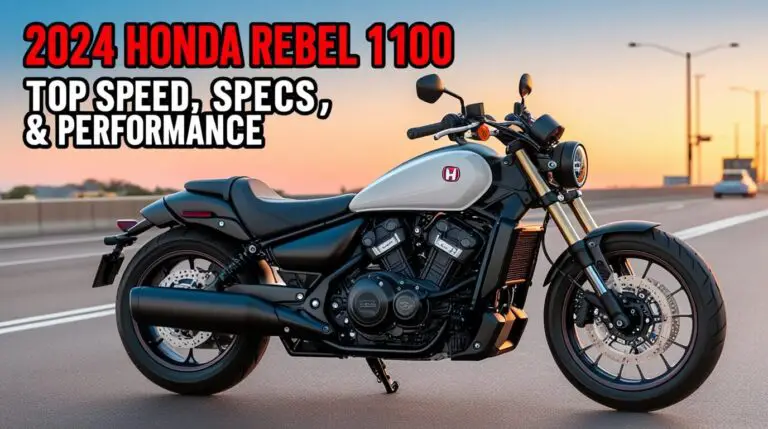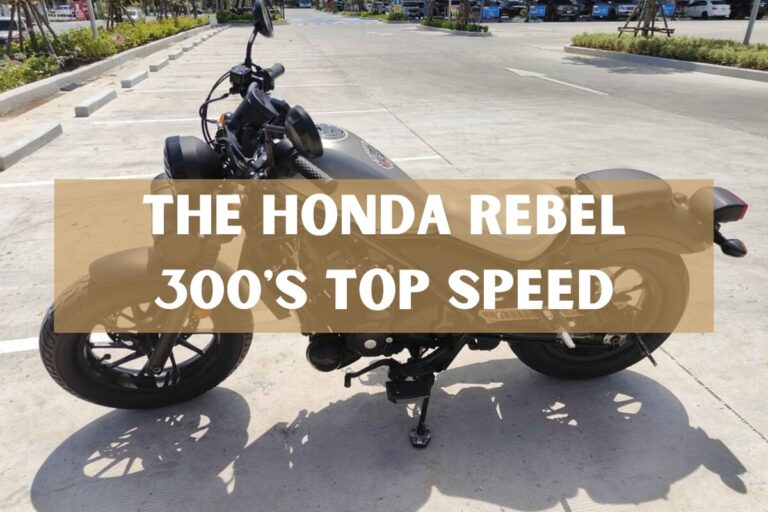2024 Honda Civic Top Speed: Performance Potential Unleashed

Are you in the market for a compact car that delivers a surprising punch of speed and performance? Look no further than the Honda Civic. While it’s known for being a practical and affordable choice, the Civic also has a sporty side that’s worth exploring, especially when it comes to its impressive top speed capabilities. Let’s examine the Honda the key speed stats of the Honda Civic, what factors influence its top speed potential, how it compares to rivals, potential modifications to make it even faster, and more.
Honda Civic Top Speed Highlights
For those seeking a compact car that can really move, the Honda Civic delivers some impressive numbers:
- The Civic hatchback EX-L and Sport Touring trims with the turbocharged 1.5L engine can reach a top speed of 139 mph.
- Even the more affordable Civic sedan with the 2.0L naturally aspirated engine tops out at a respectable 126 mph.
- When it comes to acceleration, the Civic hatchback with the turbo engine and manual transmission can sprint from 0-60 mph in as little as 7.3 seconds.
Those are some solid performance stats for an affordable compact car aimed at the mainstream market. But what allows the Civic to achieve these speeds? And how do they compare to the competition? Let’s take a closer look.
Engine Options and Performance Specs
At the heart of the Civic’s speed potential are two engine options:
| Engine | Horsepower | Torque | 0-60 mph | Top Speed | Combined MPG |
|---|---|---|---|---|---|
| 2.0L NA 4-cyl | 158 hp @ 6,500 rpm | 138 lb-ft @ 4,200 rpm | ~8.8 secs | 126 mph | 33 mpg |
| 1.5L Turbo 4-cyl | 180 hp @ 6,000 rpm | 177 lb-ft @ 1,700 rpm | 7.3 secs (manual), 7.5 secs (CVT) | 139 mph | 35 mpg |
Both engines drive the front wheels through either a 6-speed manual transmission or a CVT automatic. The turbocharged 1.5L mill is the obvious choice for maximum speed, offering more power, torque, and better acceleration than the base 2.0L engine.
What Determines a Car’s Top Speed?
While engine output is a major factor, there are several key elements that ultimately determine how fast a car can go:
Engine Power and Gearing
More horsepower and torque allow a car to keep accelerating to higher speeds. Additionally, closer gear ratios give the engine a better chance to stay in its ideal power band as speed increases.
Aerodynamics
The more aerodynamic a car’s shape is, the easier it can cut through the air at higher velocities. Sleek, low-slung designs reduce drag.
Tires and Suspension Tuning
Performance tires with stickier compounds can better grip the road at speed. Stiffer suspension also enhances stability when pushing a car’s limits.
Electronic Speed Limiters
Many manufacturers electronically limit their cars’ top speeds for safety and regulatory reasons, even if they have the power to go faster.
Owner Reviews: The Good and Bad on Civic Speed
So how does the Civic’s straight-line performance play out in the real world? Owner reviews offer some insights:
“I was pleasantly surprised by how zippy the Civic Sport Touring hatchback felt around town and even on the highway. The turbo engine gives it a nice punch when you need to pass.”
“While the Civic is fun to drive overall, I did find myself wanting a bit more low-end torque for faster acceleration from a stop. It’s not a rocket off the line.”
Overall, owners seem to enjoy the Civic’s punchy mid-range power and nimble handling, though some wish for even gutsier performance off the line.
How the Civic Stacks Up Against Competitors
To put the Honda Civic’s speed in context, let’s see how it compares to some key rivals in the compact hatchback and sedan segments:
Civic Hatchback vs Toyota Corolla Hatchback
| Model | 0-60 mph | Top Speed | Horsepower |
|---|---|---|---|
| Civic Hatchback Sport Touring | 7.3 secs (manual) | 139 mph | 180 hp |
| Corolla Hatchback XSE | ~8.0 secs | 124 mph | 169 hp |
The Civic hatch has a clear advantage in outright speed and acceleration over the Toyota Corolla, thanks to its more powerful turbocharged engine option.
Civic Sedan vs Mazda3 Sedan
| Model | 0-60 mph | Top Speed | Horsepower |
|---|---|---|---|
| Civic Sedan EX | ~8.8 secs | 126 mph | 158 hp |
| Mazda3 Sedan 2.5T | ~6.1 secs | 135 mph | 227 hp |
While the base Mazda3 sedan is down on power compared to the Civic, the turbocharged 2.5T model blows them both away in terms of raw straight-line performance.
As you can see, the Civic sits somewhere in the middle of the compact car pack when it comes to speed. It has enough punch to feel sporty and fun, but there are certainly quicker options if straight-line performance is the top priority.
Modifications to Unleash the Civic’s Speed Potential
Of course, many Civic owners look to aftermarket modifications to extract even more speed from their cars. Some of the most popular upgrades include:
- Cold air intake – Allows the engine to breathe better and make more power -Cat-back exhaust – Reduces backpressure for extra horsepower
- Engine tuning – Revised ECU mapping can safely boost power output
More extensive mods like turbo kits, upgraded intercoolers, bigger turbos, etc. can provide serious horsepower gains but start getting expensive.
It’s also important to upgrade supporting mods like wheels, tires, brakes and suspension components if you’re adding a lot of power to ensure the Civic can put it down effectively and stop from those higher speeds.
While modifying can definitely wake up the Civic’s performance, it’s wise not to go too extreme on a daily driven compact car that has to strike a balance between speed and practicality.
5 Pros and 5 Cons of the Civic’s Performance
To sum it up, here are 5 pros and 5 cons of the Honda Civic from a performance standpoint:
Pros
- Fun, sporty handling and steering feel
- Slick manual and automatic transmission options
- Affordable way to get some speed in a practical package
- Solid fuel economy even from the turbocharged engine
- Tunable platform thanks to huge aftermarket support
Cons
- Could use more low-end torque, especially with the base engine
- Road and wind noise gets intrusive at higher speeds
- No blazing straight-line speed unless you start modifying
- Lack of all-wheel drive limits traction off the line
- Honda’s reputation for reliability could be better
Should You Buy the Civic for Its Speed?
Based on the performance data and owner experiences, the 2024 Honda Civic makes a great choice for buyers who want a compact car with some zippy performance baked in, without going to the extreme of a dedicated hot hatch or sports car.
The Civic gives you more than enough speed to feel genuinely quick around town and even on the highway. It’s affordable to buy and run, easy to live with day-to-day, and has Honda’s traditional focus on practicality and efficiency.
At the same time, led-footed drivers who crave neck-snapping acceleration and face-melting straight-line speed will likely want to look elsewhere. For those buyers, something like a Civic Si, Hyundai Veloster N or VW Golf GTI/R may be a better fit.
The regular Civic hits a sweet spot for buyers who want a healthy dose of driving fun and performance, but with a focus on overall value and livability. It’s fast, but not too fast or compromised as a daily driver.
Civic Pricing, Availability and Buying Advice
Speaking of value, here’s a quick look at pricing for the 2024 Honda Civic by trim level:
- LX hatchback: $24,950
- Sport hatchback: $26,350
- EX-L hatchback: $28,650
- Sport Touring hatchback: $31,450
As you move up the trim ladder, you gain access to the more powerful turbocharged engine as well as additional convenience and tech features.
The sedan body style starts around $1,000 less than the hatchback at each respective trim level. Adding advanced safety tech like Honda Sensing is standard across the board.
When it comes to availability, the faster Sport Touring and EX-L trims with the turbo engine can often face higher demand and lower inventory than the lower trims. If you want one, you may need to act quickly or even get on a waiting list at times.
The best time to buy is typically during model year-end sales events in the late summer and fall when dealers need to clear out inventory. Discounts of $1,000 or more off MSRP are possible during these periods.
Real World Issues and Reliability Concerns
While the Civic is certainly a well-built compact car overall, there are a few real-world issues and reliability concerns that performance-minded buyers should be aware of:
- Honda issued a recall for an incorrectly assembled steering rack that could impact handling performance.
- Brakes can sometimes squeak or have issues with rotors warping prematurely under spirited driving conditions.
- The Civic’s compliance bushings can wear out faster in performance driving scenarios.
- Turbo engines put more strain on engine components like the timing chain over the long haul.
That said, J.D. Power still rates the 2024 Civic at a respectable 82/100 for overall vehicle dependability, which is about average for the class.
Proper maintenance like frequent oil changes is key to ensuring long turbo engine life. And upgrading brake pads/rotors can help counter issues in that area for aggressive drivers.
Frequently Asked Questions About Civic Top Speed
What is the top speed of a Honda Civic hatchback?
The 2024 Honda Civic hatchback EX-L and Sport Touring trims with the turbocharged 1.5L engine can reach a top speed of 139 mph.
How fast is the Honda Civic sedan?
The 2024 Civic sedan with the naturally-aspirated 2.0L four-cylinder tops out at 126 mph.
What’s the 0-60 mph time of the Civic hatchback?
With the manual transmission, the turbocharged Civic hatchback can accelerate from 0-60 mph in as little as 7.3 seconds.
Does the Civic have enough power for highway passing?
Most owners find the turbocharged Civic provides plenty of midrange punch for safe highway passing maneuvers.
Can you increase the Civic’s top speed with modifications?
Yes, aftermarket mods like intakes, exhausts, engine tuning and more can push the Civic’s top speed higher, though this requires spending more money.
Final Thoughts on the Civic’s Sporty Side
All things considered, the 2024 Honda Civic manages to strike an impressive balance between affordable practicality and legitimate driving thrills, especially when equipped with the punchy turbocharged engine.
While it may not be a world-beating speed demon in stock form, the Civic packs more than enough straight-line performance for most daily driving situations. Its real strengths lie in its nimble, fun-to-drive character and Honda’s ability to make it feel lively and sporty at legal speeds.
Add in the Civic’s efficiency, roomy interiors, huge aftermarket tuning potential and approachable pricing, and you have an overall compelling package for buyers seeking a compact car that plays the role of sporty runabout and sensible daily driver equally well.
So if you’re in the market for a mainstream compact that can turn up the wick a bit when you want to have some fun, the 2024 Honda Civic is absolutely worth a close look. Just don’t go in expecting mind-bending speeds or racecar-like performance out of the box. A turbocharged Civic is quick, but its talents are meant to be enjoyed responsibly and within reason.






